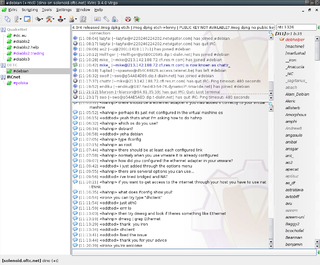
Irssi is an Internet Relay Chat (IRC) client program for Linux, FreeBSD, macOS and Microsoft Windows. It was originally written by Timo Sirainen, and released under the terms of the GNU GPL-2.0-or-later in January 1999.

Shareaza is a peer-to-peer file sharing client running under Microsoft Windows which supports the gnutella, Gnutella2 (G2), eDonkey, BitTorrent, FTP, HTTP and HTTPS network protocols and handles magnet links, ed2k links, and the now deprecated gnutella and Piolet links. It is available in 30 languages.

ChatZilla is an IRC client that is part of SeaMonkey. It was previously an extension for Mozilla-based browsers such as Firefox, introduced in 2000. It is cross-platform open source software which has been noted for its consistent appearance across platforms, CSS appearance customization and scripting.
Trillian is a proprietary multiprotocol instant messaging application created by Cerulean Studios. It is currently available for Microsoft Windows, Mac OS X, Linux, Android, iOS, BlackBerry OS, and the Web. It can connect to multiple IM services, such as AIM, Bonjour, Facebook Messenger, Google Talk (Hangouts), IRC, XMPP (Jabber), VZ, and Yahoo! Messenger networks; as well as social networking sites, such as Facebook, Foursquare, LinkedIn, and Twitter; and email services, such as POP3 and IMAP.

Pidgin is a free and open-source multi-platform instant messaging client, based on a library named libpurple that has support for many instant messaging protocols, allowing the user to simultaneously log in to various services from a single application, with a single interface for both popular and obsolete protocols, thus avoiding the hassle of having to deal with new software for each device and protocol.

Adium is a free and open-source instant messaging client for macOS that supports multiple IM networks, including XMPP (Jabber), IRC and more. In the past, it has also supported AIM, ICQ, Windows Live Messenger and Yahoo! Messenger. Adium is written using macOS's Cocoa API, and it is released under the GNU GPL-2.0-or-later and many other licenses for components that are distributed with Adium.

Bersirc is a discontinued open-source Internet Relay Chat client for the Microsoft Windows operating system. Linux and Mac OS X versions were "in development". Bersirc uses the Claro toolkit, which aims to provide an interface to native windowing systems and widgets on all operating systems. Microsoft .NET and Qt toolkit ports were also planned. The final version of Bersirc was 2.2.14.

Psi is a free instant messaging client for the XMPP protocol which uses the Qt toolkit. It runs on Linux, Windows, macOS and OS/2.

aMule is a free peer-to-peer file sharing utility that works with the eDonkey network and the Kad network, offering similar features to eMule and adding others such as GeoIP. On August 18, 2003 it was forked from the xMule source code, which itself is a fork of the lMule project, which was the first attempt to bring the eMule client to Linux. These projects were discontinued and aMule is the resulting project, though aMule has less and less resemblance to the client that sired it.
Mozilla Firefox has features which distinguish it from other web browsers, such as Google Chrome, Safari, and Microsoft Edge.

BitlBee is a cross-platform IRC instant messaging gateway, licensed under the terms of the GNU General Public License.

Twisted is an event-driven network programming framework written in Python and licensed under the MIT License.

Gobby is a free software collaborative real-time editor available on Windows and Unix-like platforms. It was initially released in June 2005 by the 0x539 dev group. Gobby uses GTK+ for its GUI widgets.
The following tables compare general and technical information between a number of notable IRC client programs which have been discussed in independent, reliable prior published sources.

MSN Messenger, later rebranded as Windows Live Messenger, was a cross-platform instant-messaging client developed by Microsoft. It connected to the now-discontinued Microsoft Messenger service and, in later versions, was compatible with Yahoo! Messenger and Facebook Messenger. The service was discontinued in 2013 and was replaced by Skype.

QIP is a multiprotocol instant messaging client. It is a closed source freeware program originally developed by Ilgam Zyulkorneev. In 2008 it was bought by RosBusinessConsulting media group and named most popular RBC service in 2009.

aMSN was a free Windows Live Messenger clone. aMSN attempted to emulate the look and feel of Windows Live Messenger, and supported many of its features. It had been downloaded approximately 40 million times as of January 2011, making it the 21st most downloaded project on SourceForge.

KVIrc is a graphical IRC client for Linux, Unix, Mac OS and Windows. The name is an acronym of K Visual IRC in which the K stands for a dependency to KDE, which became optional from version 2.0.0. The software is based on the Qt framework and its code is released under a modified GNU General Public License.

Quassel IRC, or Quassel, is a graphical, distributed, cross-platform IRC client, introduced in 2008. It is released under the GNU General Public License version 2 and version 3, for GNU and Unix-like operating systems, macOS, and Microsoft Windows. It has also been ported to OS/2 Warp due to its cross-platform nature. Since the release of Kubuntu 9.04 Quassel is Kubuntu's default IRC client. Quassel uses the Qt application framework.

Sublime Text is a shareware text and source code editor available for Windows, macOS, and Linux. It natively supports many programming languages and markup languages. Users can customize it with themes and expand its functionality with plugins, typically community-built and maintained under free-software licenses. To facilitate plugins, Sublime Text features a Python API. The editor utilizes minimal interface and contains features for programmers including configurable syntax highlighting, code folding, search-and-replace supporting regular-expressions, terminal output window, and more. It is proprietary software, but a free evaluation version is available.















